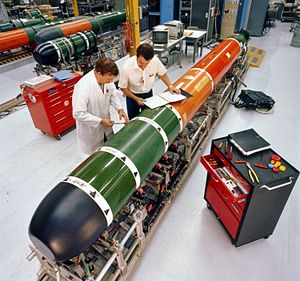
1972–present (Mod 1) 1988–present (ADCAP)
The Mark 48 and its improved Advanced Capability (ADCAP) variant are American heavyweight submarine-launched torpedoes. They were designed to sink deep-diving nuclear-powered submarines and high-performance surface ships.
The Mk-48 torpedo was designed at the end of the 1960s to keep up with the advances in Soviet submarine technology. Operational since 1972, it replaced the Mk-37 and Mk-14 torpedoes as the principal weapon of U.S. Navy submarines.
The Mk-48 torpedo is designed to be launched from submarine torpedo tubes. The weapon is carried by all U.S. Navy submarines, including Ohio-class ballistic missile submarines and Seawolf-, Los Angeles-, and Virginia-class attack submarines. It is also used on Canadian, Australian, and Dutch submarines. The Royal Navy elected not to buy the Mark 48, preferring to use the Spearfish instead.
Mk-48 and Mk-48 ADCAP torpedoes can be guided from a submarine by wires attached to the torpedo. They can also use their own active or passive sensors to execute programmed target search, acquisition, and attack procedures. The torpedo is designed to detonate under the keel of a surface ship, breaking the ship's back and destroying its structural integrity. In the event of a miss, it can circle back for another attempt.